Author:Ignas | DeFi Research
Compiled by: TechFlow
Cryptocurrencies are like a game: you trade tokens, earn (or lose) money, and grow your following on X platform. Doesn't it feel that way to you? But unlike real games, failures in the crypto realm can have severe consequences. For example, after the Terra collapse, according to the father's online search history, a South Korean family of three (including a 10-year-old daughter) was suspected of suicide due to financial losses.
This makes me feel guilty, as too many people have been deceived and lost their life savings.
However, the mindset of viewing crypto as a game helps me stay rational and motivates me to keep participating. The level of craziness we've experienced in this industry is unprecedented. Yet, the massive rewards this game offers make it worth a try: financial freedom.
As DegenSpartan said in a deleted tweet: "You have a brief window after graduation to make high-risk investments to reach elite status, or else you'll be a wage slave for life."
In this blog post, I want to share the gameplay of the crypto game, my mental framework, and tips on how to choose and win your crypto game.
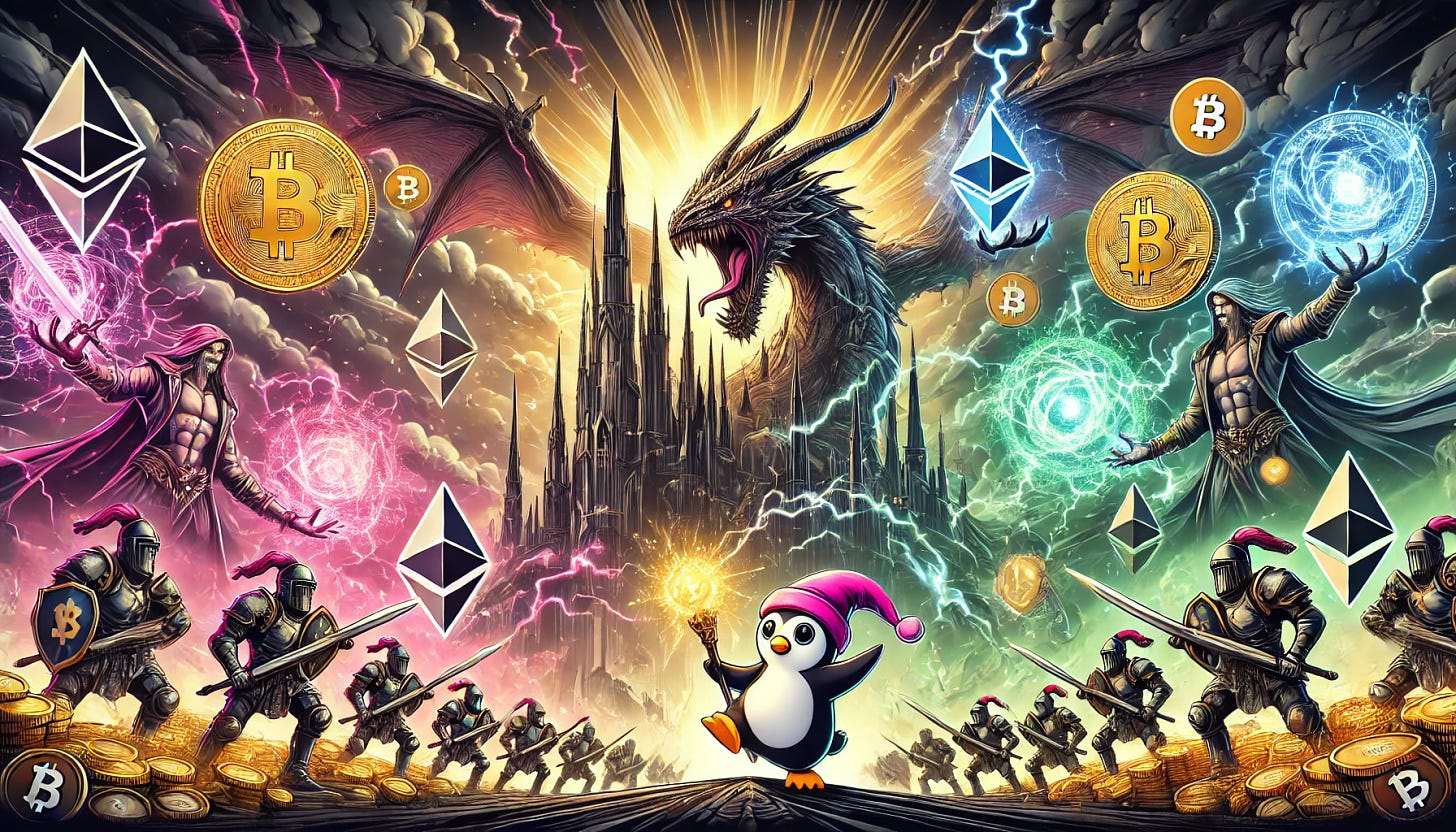
The Rules of the Crypto Game
Once you realize the analogy between cryptocurrencies and (especially MMORPG) games, you can no longer ignore it.
In bear markets, when there is no new capital inflow, we engage in "PvP - Player vs Player" trading.
In bull markets, with the influx of new retail capital, we shift to "PvE - Player vs Environment" mode.
If you're frustrated by influencer sell-offs, we often defend ourselves by saying "don't hate the player, hate the game." We even design token economics and game theory to prevent people from selling.
Just like every game upgrade, the crypto game is constantly evolving, with new storylines emerging and disappearing.
For example, the former top Non-Fungible Token (NFT) player Pranksy is now completely out of touch with the meme coin trend. Although the gameplay has changed, he is still playing a game that almost no one is interested in.
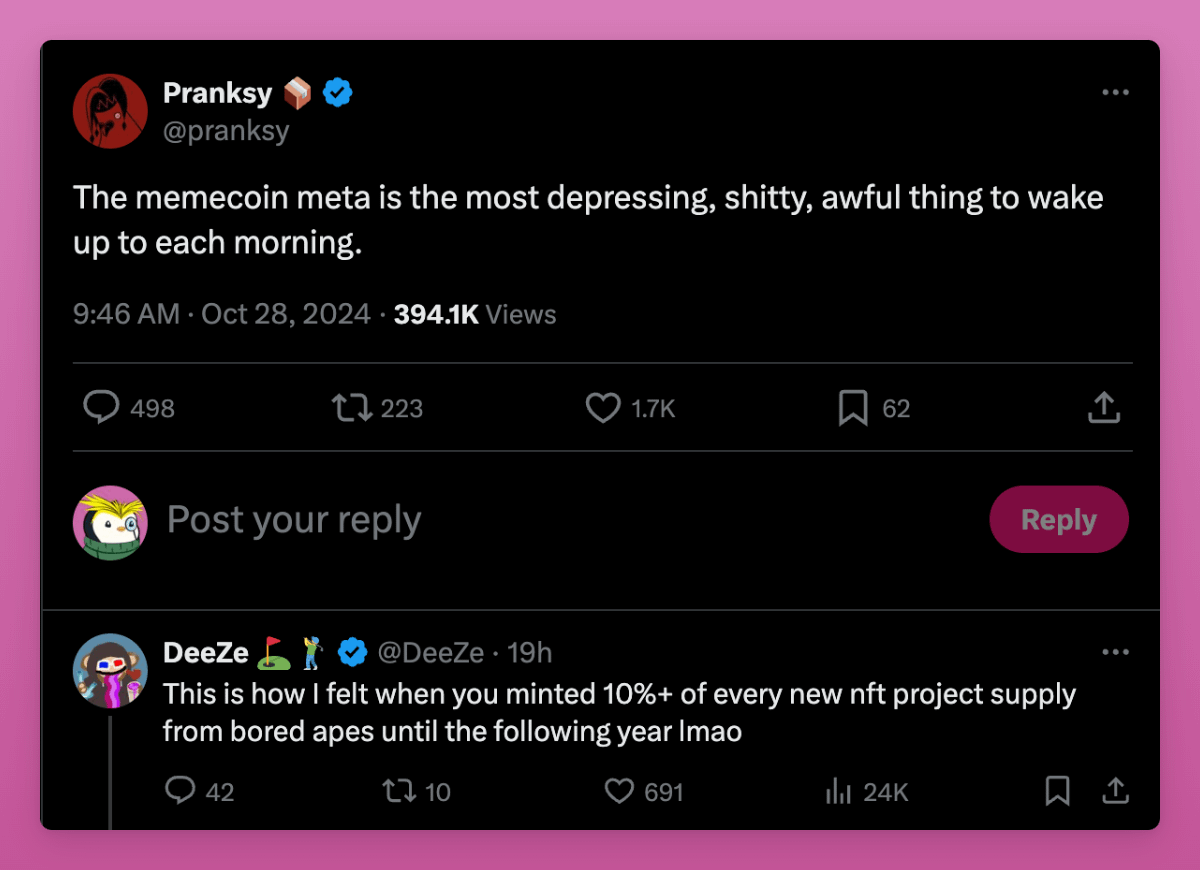
In this game, you have two choices: either adapt and participate, or don't participate and wait for the gameplay to change.
There is also a harder choice, which is to change the rules of the game.
For instance, Cobie launched the Echo platform, allowing regular investors to participate in venture capital and buy tokens like in the ICO era. Gradually, those players who decide to change the game will push the meme coin narrative to the periphery.
However, meme coins do deserve recognition, as they have successfully changed the game rules.
In the past year, we've been playing a "points" game: you deposit $$$ into a protocol, accumulate points, and then pray for a generous airdrop. I know you like this game, as my "DeFi Investor's Playbook to the Bull" is still my most popular article.
However, it turns out that many people have been played instead.
Due to higher TVL proving higher valuations, tokens launch at ridiculous FDVs, which only benefits the venture capitalists, teams, and airdrop farmers who entered at lower valuations.
Tired of this, many have turned to meme coins, which lack the qualities that venture-backed tokens possess.
While Pranksy has lost (or chosen not to participate), the main characters of the meme coin saga, Ansem, Murad, and anyone who joined their camp, are winning.
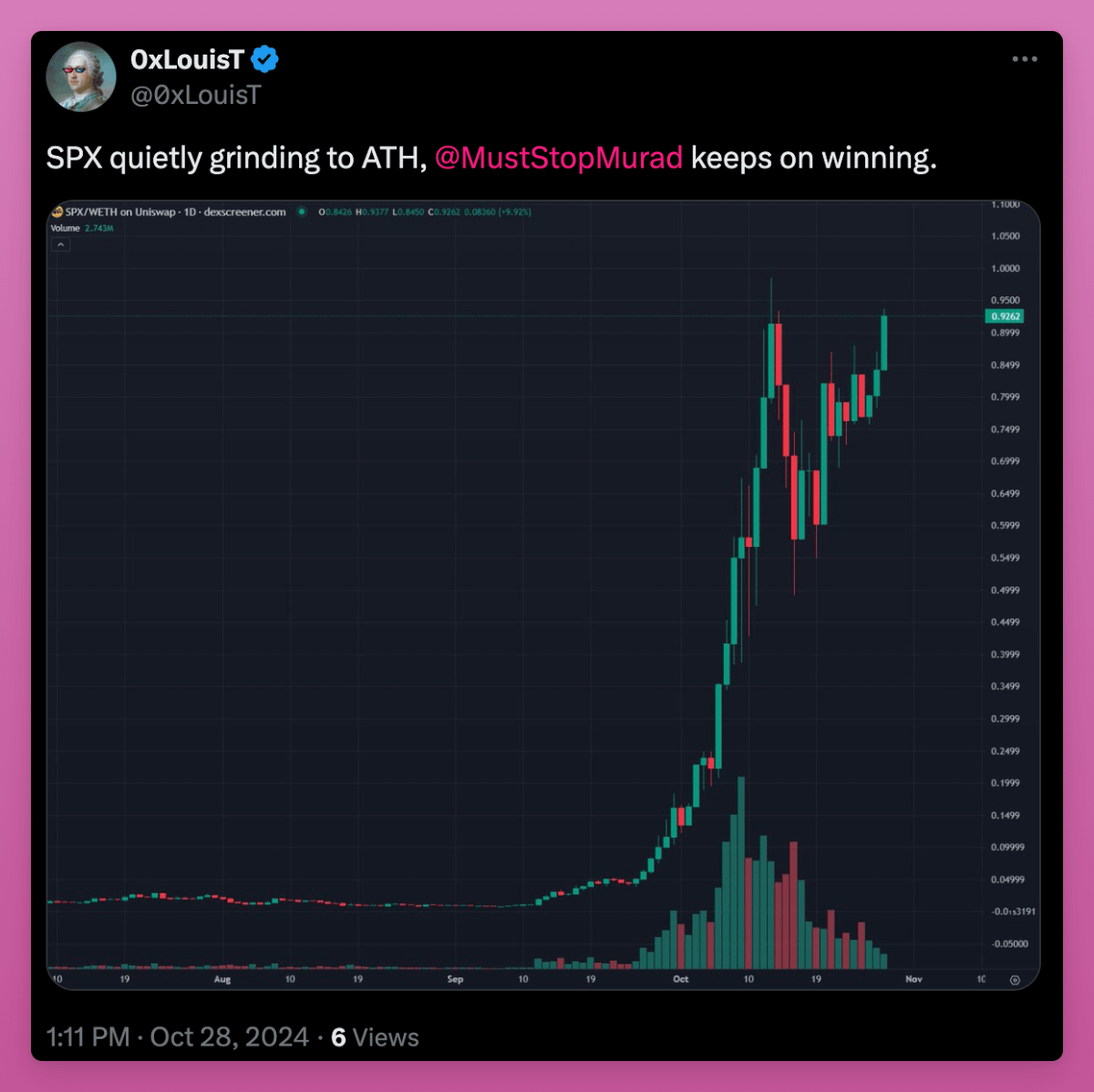
"Don't hate the player, hate the game"
Throughout the meta-game, we constantly introduce new mini-games. You need to decide whether to participate.
If you choose to participate, make sure you understand the rules, as there will always be opponents.
For example, DAOS FUN allows trading of tokenized funds, but confusingly, the top "fund" ai16z is trading at 52x its Net Asset Value (NAV), making its trading look like a meme coin.
All players are struggling to understand it all. Squiggly compares this fund to a "Grayscale structure" or a Ponzi scheme with Friendtech-like trading fees, while BREAD disagrees with some of Friendtech's aspects.
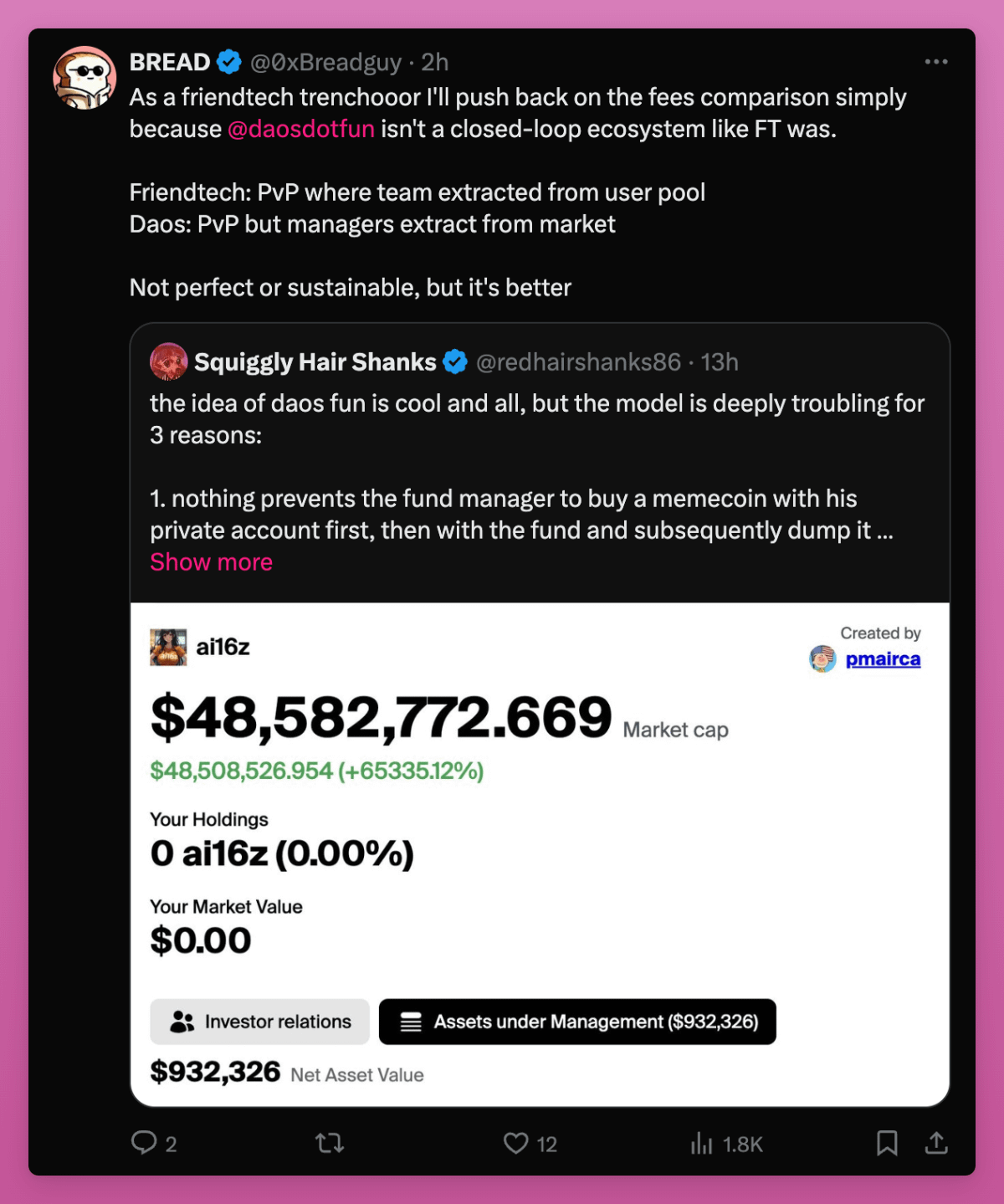
Who is right?
It's the same product, but players interpret it differently.
Finding your edge in the game to profit from it may be quite straightforward. After a team announced they would whitelist a new "fund" on their website, I expected speculators holding other "fund tokens" to sell some of their old fund tokens to invest in the new fund, causing the prices to drop. Sure enough, once the new fund was added, the prices of all the old funds dropped by around 50%.
Generally, the more chaotic the gameplay, the more obvious the knowledge asymmetries you can exploit to make a profit.
The beauty of cryptocurrencies is that there are always speculators following new trends without due diligence, and if you do a little basic research, you can seize the opportunities to profit.
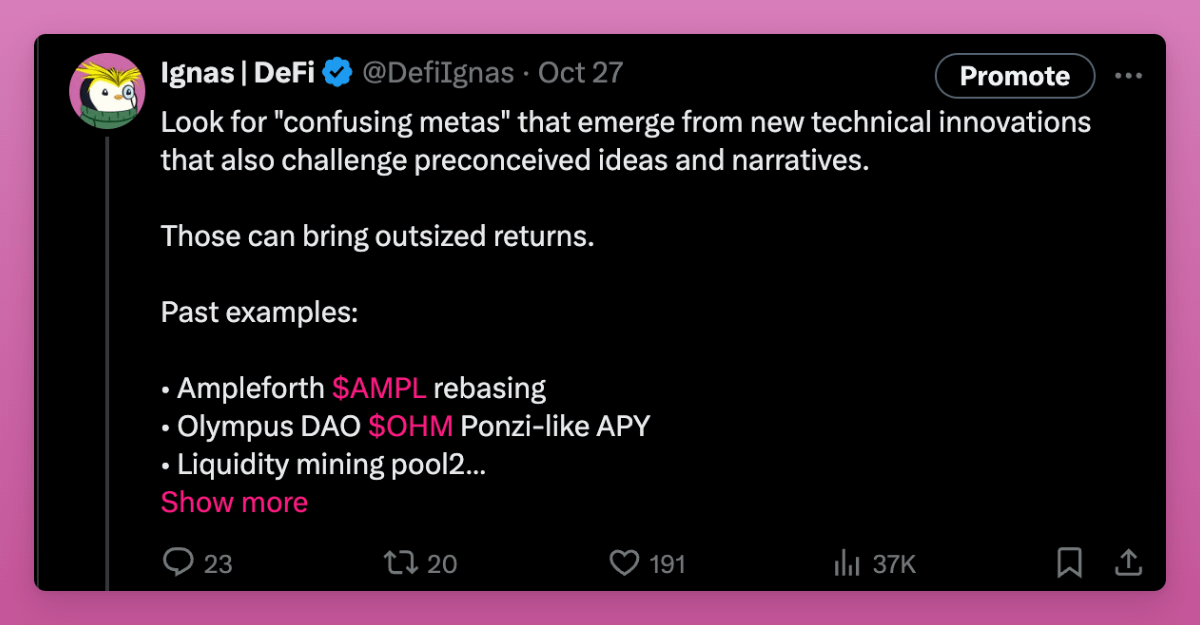
That said, I often invest a little in hot new projects before understanding how they actually work, learning as I go. I only commit more capital when I know I can win the game.
The thriving tap-to-earn mini-games like Ton are successful because they are vastly different from the complex DeFi games - you just need to tap a button on the screen to earn money.
However, due to the simplicity of the game, the rewards are relatively low, unless you control hundreds of phones and artificial fingers to manipulate the system.
This is why cryptocurrencies have become ten times more interesting and complex: you can choose multiple layers, roles, and strategies, similar to side quests.
Let me give you an example. I've been working hard to become an active delegate in multiple DAOs, particularly Lido, Arbitrum, and Uniswap.
While DAOs promote the vision of decentralized organizations, we now know that most DAOs are not actually decentralized. For example, in the Arbitrum DAO, just 14 addresses control over 50% of the voting power, and other DAOs are similar.
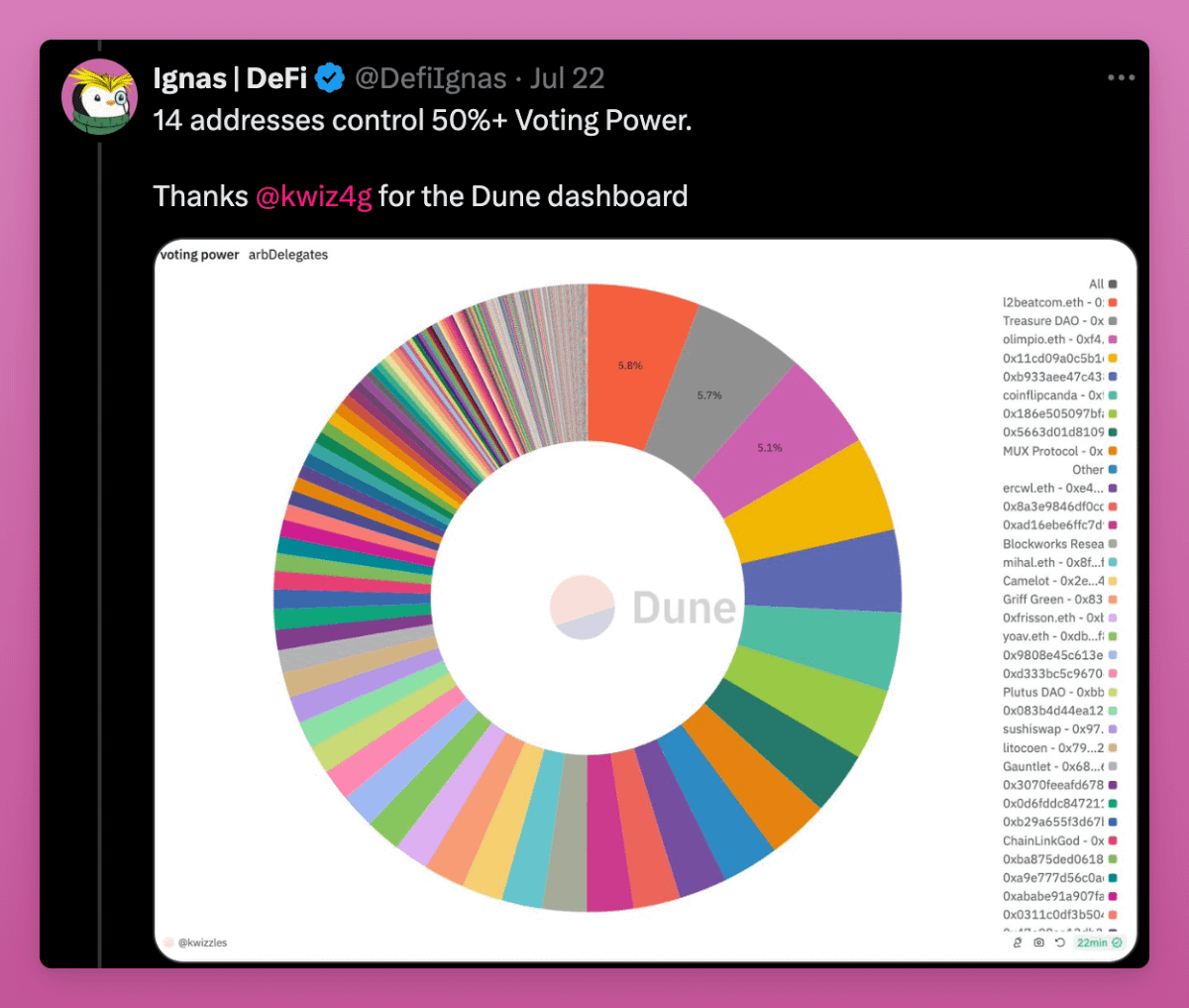
The Uniswap DAO was unaware that Unichain would launch a $UNI staking feature. This explains why the Uniswap fee switch has remained off for months - the insiders knew that once UNI staking is implemented, the fee switch would no longer be needed, while the DAO was kept in the dark.
DAOs recognize that vote concentration is a major issue. To address this, they have launched delegate incentive programs to attract new participants. After becoming an active delegate, you can earn $3,000 to $10,000 in rewards from each DAO.
However, this is not an easy task.
You need to actively participate in forum discussions, write comments, and vote on proposals. The most challenging part is gaining token delegations, where political factors start to come into play.
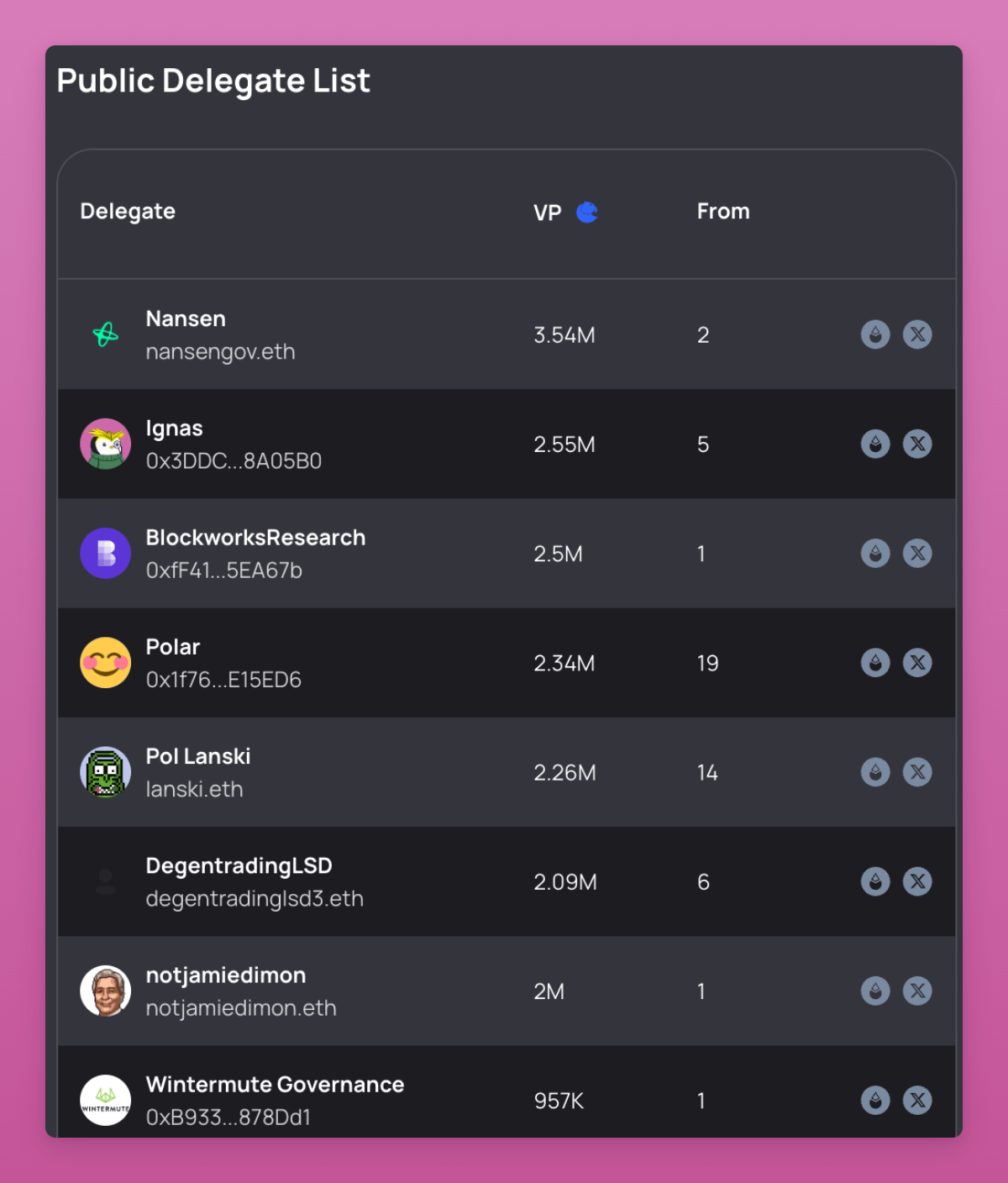
After discussing token holder and protocol incentive alignment on Twitter, an anonymous whale delegated 2.5 million LDO to me. To be honest, I received this delegation because I was well-known for my posts on X. Playing the popularity game on X has opened up many opportunities for me in the crypto space, which most people are unaware of.
Now, multiple protocols reach out to me, thanking me for voting on their proposals or requesting my support for future proposals. There is an important relationship-building process in each DAO that is not obvious from X dynamics or DAO forums.
The Mindset of a Gamer
Do you know that Vitalik Buterin started Ethereum shortly after Blizzard removed the damage component of the beloved Warlock's Life Tap spell?
"I cried myself to sleep that night, realizing the terrible consequences centralized services could bring. I quickly decided to quit." Vitalik (his personal page bio has since been deleted).
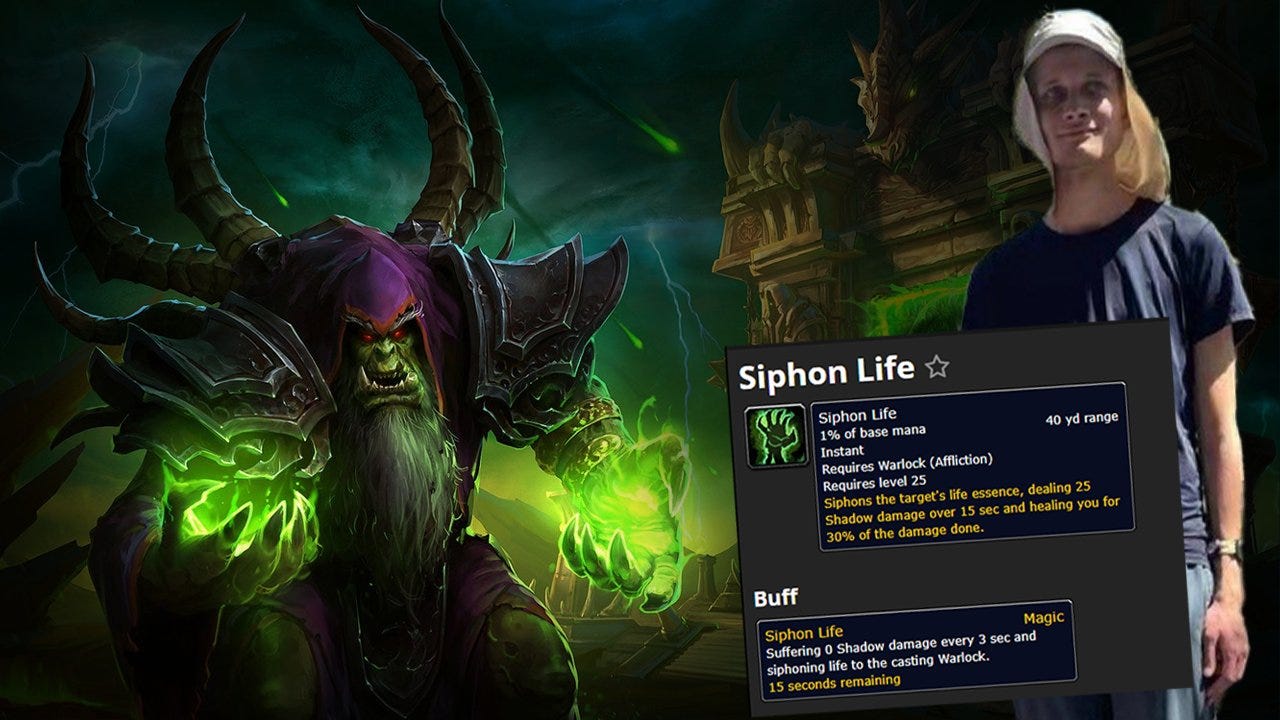
Vitalik decided to quit World of Warcraft because he felt he had no influence over the game rules.
The appeal of cryptocurrencies is that we can all participate and influence the rules of the game.
Just like blockchains, the gameplay of cryptocurrencies is decentralized. Venture capitalists, retail investors, developers, and KOLs—we all play different roles, with some having more influence than others.
Ansem, Murad, and other meme coin influencers drive the meme coin cycle, but you can choose not to participate in their game by simply not discussing or buying meme coins.
A bit off-topic, but I'm surprised by how little influence venture capitalists have in shaping the narrative. Crypto venture capitalists should be advocating for their investments, but their presence on X is quite low.
Do they really care? Or are they playing a different game?
A notable example is Multicoin's Kyle, who is promoting his own investments. More venture capitalists should share their vision for the industry, support the protocols they invest in, and provide in-depth research to elucidate current development dynamics.
Based on my interviews with crypto venture capitalists, a possible explanation is that they are essentially just regular speculators, but with more money at hand.
In a strange coincidence, while Vitalik was playing World of Warcraft (2007-2010), I was playing another MMORPG game—Lineage 2.
In Lineage 2, you could choose a race (such as human, elf, orc) and a class (such as warrior, mystic).
You gained experience points (XP) by completing quests and defeating enemies to level up. Leveling up unlocked new skills, better gear, and more challenging content.
I spent two years grinding levels, sleeping only a few hours a day. These memories are deeply etched in my mind, influencing my perspective on crypto trading.
Just as you gained XP in the game, in the crypto space, you accumulate experience by learning about blockchains, understanding DeFi, researching token economics, and so on. The more you put in, the more you can master these domains.
In the grinding process, you also need to keep an eye on your HP (health points) and MP (mana points).

HP and MP are like your health, financial stability, and emotional resilience. Whether in crypto or games, it requires relentless effort, which can lead to burnout. In the crypto space, the pressure to stay ahead, constantly monitor the market, and not miss out on trends creates a high-stress environment, like being trapped in an endless game.
In the previous bull market cycle, I felt very fatigued, so now I take a break every three months to manage my "HP".
Does my perspective on crypto sound strange?
The similarities also extend to the demographics: the primary participants in crypto are male, just as only about 35% of MMORPG players are female.
Koreans' enthusiasm for crypto is as intense as their obsession with esports (like League of Legends), even surpassing traditional sports. No wonder the GameFi narrative has so much support in the crypto space.
The point I'm trying to make is that the mindset of a gamer can help you stand out in the crypto space. You just need to choose the right game and understand your role in it.
In his famous essay How to Get Rich (Without Getting Lucky), Naval mentions "game" and "gameplay" a whopping 15 times! His advice is:
"Ignore the status game players. They gain status by attacking the wealth creators."
"Choose an industry where you can play a long-term game with long-term partners."
"Play iterated games. All returns in life, whether wealth, relationships, or knowledge, are the result of compound interest."
And my favorite is:
"Building specific knowledge will feel like play to you, but like work to others."
So, what game are you playing in the crypto space?
What is Your Role in Crypto?
Crypto has become increasingly complex in recent years. Before 2020, success was often as simple as investing in ICOs and trading on centralized exchanges (CEXs). But since then, the number of crypto domains has exploded: DeFi, Layer 2s, Non-Fungible Tokens (NFTs), Real-World Assets (RWAs), Runes, meme coins, and more.
So, how do you keep up with these changes?
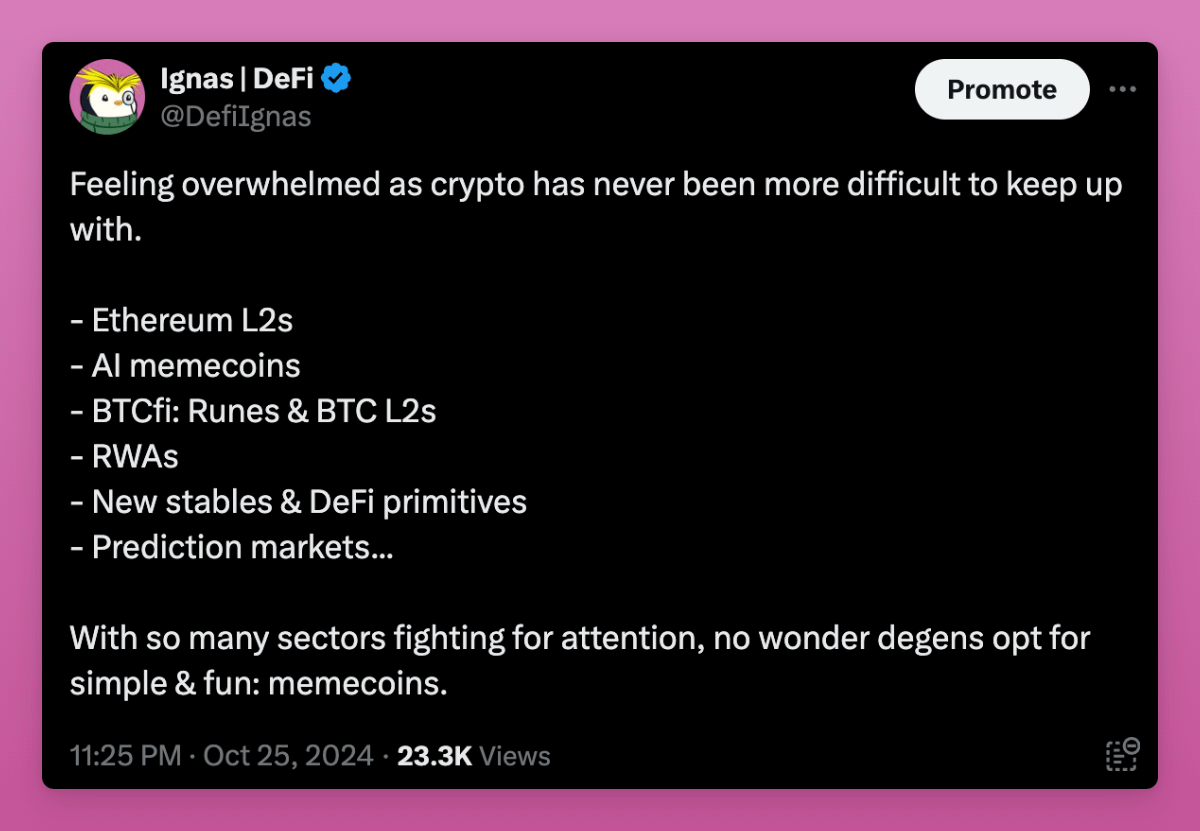
Do you focus on a specific domain, or do you try to "collect them all"?
In MMORPGs, you first choose a race, then a class. In Lineage 2, I chose the least popular option, hoping to stand out and increase my chances of becoming a "hero".
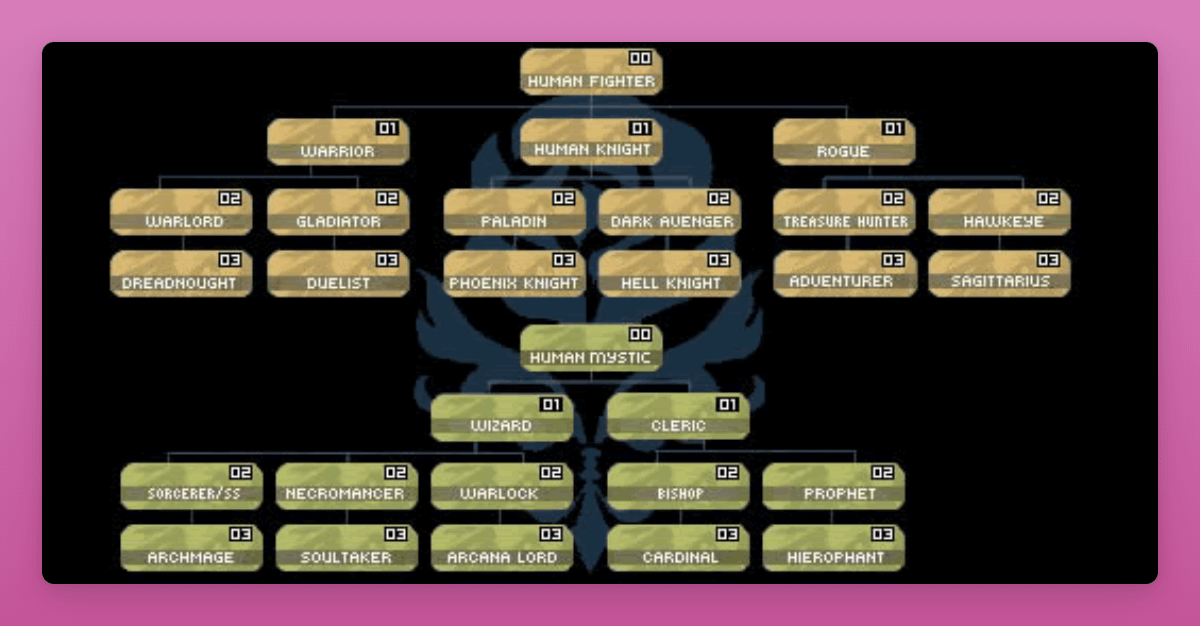
I chose a human mystic, and as I gained XP, I specialized in Warlock and then Arcana Lord. This class was the least popular because it relied on a pet to defeat enemies.
Similarly, in the crypto space, you first learn the basic skills, and then you can focus on active trading, DeFi yield farming, meme coins, DAO delegations, and so on.
Many people lack the determination to learn specific skills, often jumping between different narratives without truly understanding them. This causes them to miss out on the knowledge required to master the complex mechanics of a particular domain, ultimately becoming part of the exit liquidity.
In fact, being able to jump between different narratives while earning capital can be a specific skill. In this case, you can identify the games of capital rotation and sell out before the capital shifts to another narrative. Are you good at this?
However, I believe that in the current market stage, focusing on a specific domain can yield significant results:
Crypto Koryo is skilled at creating and monetizing content using Dune dashboards.
USD Denominated on X specializes in the stablecoin market, adeptly navigating its complexities to achieve the highest yields.
Andy is fully committed to modular storytelling, although this field is highly questioned in the cryptocurrency space.
wale.moca is an excellent account that focuses on NFTs (what a strong conviction!)








